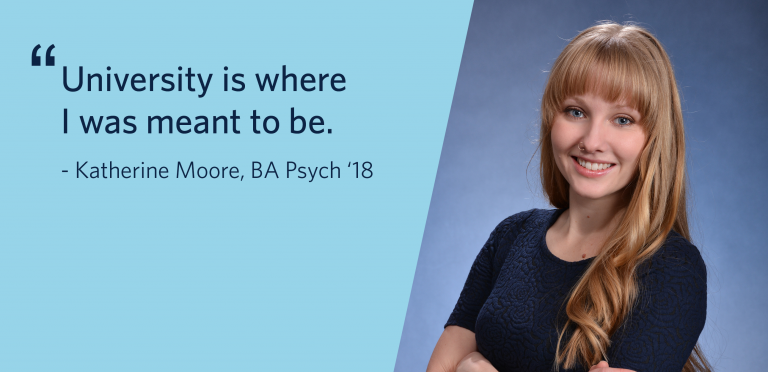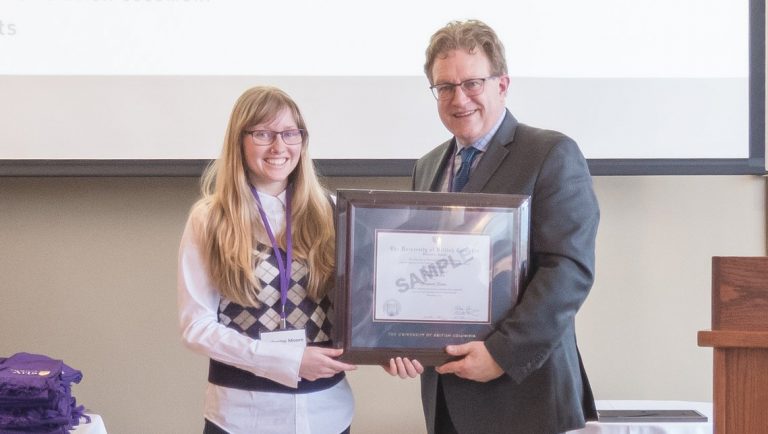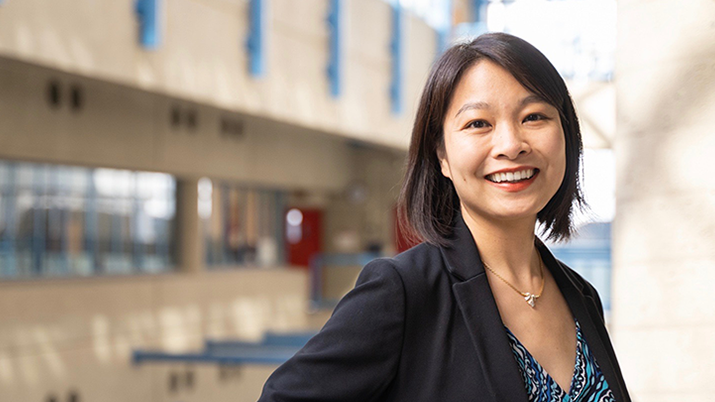

Growing up, Katherine Moore had a hard upbringing and she struggled. There was poverty and drug use in her community—and dysfunction at home. When Moore graduated from high school, university seemed out of reach for her. Despite these challenges, she pursued her degree in psychology and is working towards fulfilling her dream of becoming a psychologist.
“When I was really young, I had a difficult childhood,” says Moore, who graduates from UBC on May 25. “I grew up in a horrible learning environment and I wasn’t exposed to anything in the world. When I came to UBC, I saw the immense difference in myself and other students. I didn’t feel like I belonged.”
Moore channeled her background into a determination to help others; she decided to major in psychology and help other youth who faced the same challenges she did. She volunteers with organizations that are developing social policies to support youth development, in particular mental health and family support services. Moore sits on the steering committee of First Call: BC Child and Youth Advocacy Coalition and is working with a team of student leaders in partnership with the Canadian Mental Health Association to change campus culture around mental health. She also volunteered with Covenant House Vancouver to support homeless youth and was an ambassador for the UBC Wellbeing Design Lab, a hub for all wellbeing-related initiatives on campus.
As a research assistant, she studied positive psychology and mental health and wellbeing in students on UBC’s campus. She has co-authored two papers about teaching practices that impact student wellbeing and has presented her positive psychology research at an international conference. She is also submitting a book proposal to Springer with Dr. Rhea Owens, a former professor in the department of educational and counselling psychology at UBC, about this research. With Dr. Owens, she is currently developing a handbook for mentors on how to support at-risk youth.
Katherine’s resilience and perseverance paid off. In 2018, she received the ‘Wesbrook Scholar’ award—one of the most prestigious awards for undergraduate students at UBC—and the ‘Outstanding Leadership in the UBC Community and Beyond’ award from UBC’s faculty of arts. More.


Katherine Moore and Arts Dean Gage Averill
In pursuing her dream of becoming a psychologist, Moore draws strength from her childhood. She is motivated to create positive social circumstances to help prevent children from going through the same hardships she did. Next year, she hopes to pursue a master’s degree in counselling psychology and deepen her political engagement.
“University is where I was meant to be,” says Moore. “Through my MA and PhD, I’m hoping to dig deeper into the social situations that can create unhappy children. In the future, I’d like to open my own practice as a psychologist and continue my political advocacy work.”
Moore was chosen to represent her psychology peers as Graduating Student Speaker at the convocation ceremony on May 25; an achievement she is proud of. As the speaker, she will reflect on her experiences at UBC and speak on behalf of her peers.
In advance of graduation, Moore reflects on her time as a psychology student, shares her proudest moments, andoffers advice for students on carving out their own academic path.
Why did you choose psychology?
Early on in my life I noticed that I was very skilled at helping my friends resolve their interpersonal issues and derived a lot of joy from it. The idea of becoming a psychologist was sparked by this realization, but I didn’t feel as though I belonged in university when I was choosing what to do after high school. So, I decided to follow my interest in physical health instead. However, when I was a personal trainer I began to suspect that the physical issues my clients were hoping to address might have stemmed from psychological phenomenon, like an unhelpful belief system or a deeply ingrained psychological pattern. My qualifications prevented me from providing psychological counsel, so I decided to go back to school and fulfill my dream of becoming a psychologist. Shortly afterwards I enrolled in an undergraduate degree in psychology.
Is there a single most important moment that has stood out for you during your time as a psychology student?
I started my studies at Carlton University before transferring to UBC. In my first semester, I took a course focusing on youth experiences across the globe. One of our assignments was to find an issue around the world that affected youth, to devise a solution and share that solution with someone who could actually put it into action. My civic engagement at the time wholly consisted of voting in federal elections, so I was thrilled with this opportunity to try something new. I began researching policy proposals and strategic plans across Canada that related to youth development. When I came across a strategic plan issued by the Ministry of Child and Family Development in BC, I was hooked. I read every page of that lengthy document as if it were a captivating novel. Eventually I deduced that the government had placed a great deal of emphasis on actions that were reactive instead of preventative and sent a letter to the minister with my thoughts on how to remediate this. This assignment was a turning point in my career. It shifted my focus from becoming a psychologist that helps people heal from trauma to someone who also is active within the political realm with the intent of preventing circumstances that would necessitate therapy in the first place.
What is your favourite class and why?
My absolute favourite class was Psych 307: Brain and Behaviour taught by Dr. Steven Barnes. The content of this class was difficult, but deeply satisfying to me. Since I’m interested in talk therapy and interpersonal relationships I deal with a lot of social psychology on a daily basis. But I’m also incredibly interested in how ones biology is implicated in behaviour. This course explains human behaviour at the cellular level, and I found that fascinating. However, what made this course so incredible was Dr. Steven Barnes. Let’s be honest, I want him to be my best friend – he is amazing. This man is down to earth, highly motivated to support student wellbeing, incredibly knowledgeable and genuinely interested in student success. His lectures are very engaging and fun – don’t miss out on this class!
What advice do you have for students on how to carve their own academic path?
Follow your curiosity. Your curiosity is a powerful thing that, if followed, can bring you places you would have never expected. However, bravery is required to allow that process to unfold. It is 100% possible to sit at home and satisfy your curiosity by reading – and you should definitely do this – but I feel that you could get more out of the process by exploring what you’re curious about by engaging with other people too. That’s where bravery is needed the most, as understanding the things you’re curious about often requires you put yourself in situations that could be a bit uncomfortable. For example, at one point in time I was really curious how social change actually happened. I wasn’t sure if groups of people, say protesters, were powerful enough to foster social change, if non-profit organizations were more effective or if politicians held all the power. So I found a few people in town who were involved in each of these activities and set up meetings with them to hear their perspectives. One of those people was Jonny Morris from the Canadian Mental Health Association. At the time he worked as their Senior Director of Policy, Research and Planning and gave me lots of insight about how our formal and informal system of social change works. Impressed by my enthusiasm he connected me with several people in the organization and I’ve been volunteering with them ever since. I mention this because it took bravery to let go of self-deprecating thoughts like “why would a senior staff at the CMHA want to speak with an undergraduate student who hasn’t done anything in the world?” and email him anyway. If you’re curious about something – a topic, a career path or something as complex as how social change works – find someone who might be able to teach you something about it and ask them lots of questions. Don’t let discomfort stop you.
What do you do when you’re not studying?
Unfortunately, I’m sad to say that when I’m not studying – I’m working. I would not recommend other students to do this. I overworked myself during my degree and suffered psychologically, socially and physically because of it. However, I was able to maintain a modest self-care routine that involved jogging along the beach, meditating and finding small beautiful moments in my day. Also, I watched a lot of videos of babies laughing. So adorable.
What are your plans after graduating?
I’m going to take a year off of school to enjoy my life and bring back some of the balance I lost. I intend to spend as much time as I can in the mountains, exercise and meditate more regularly and give more of my time to the people that I love. After that I hope to start a Master of Arts program in Counselling Psychology at UBC.


